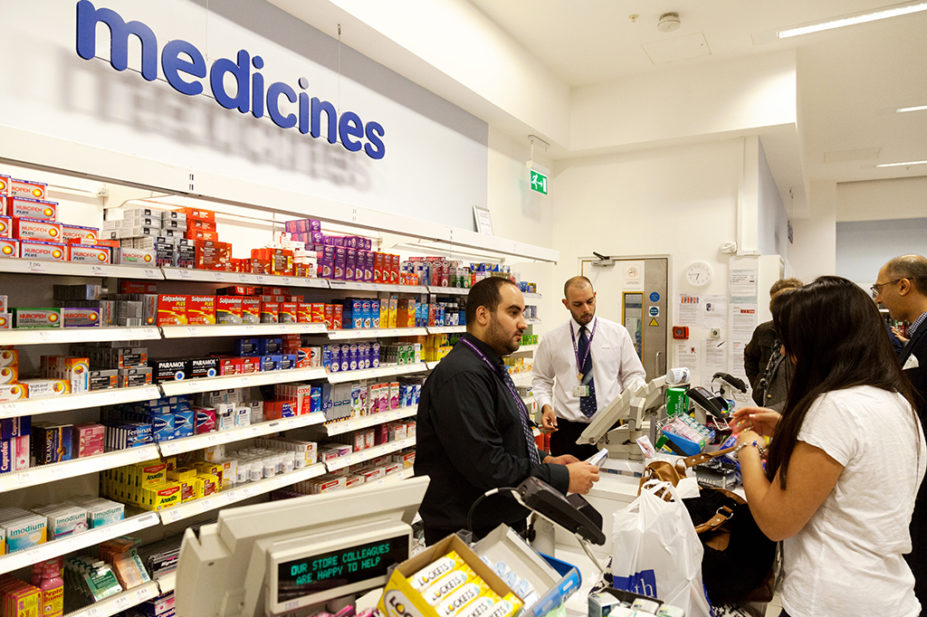
Kumar Sriskandan / Alamy Stock Photo
Three-quarters of pharmacy staff members considered leaving their role or the profession over the past year, the results of a workforce wellbeing survey carried out by the Royal Pharmaceutical Society (RPS) have revealed.
The survey, carried out between September and October 2022, is the fourth annual survey run in partnership with the charity Pharmacist Support on the state of mental health and wellbeing in the profession.
Overall, 1,496 responses were received, with the majority from white, female pharmacists working in community settings in England.
According to the RPS’s report on the survey, published on 12 January 2023, there was an increase in the number of respondents rating their mental health as ‘good’ or ‘very good’ from 17% in 2020 — during the height of the COVID-19 pandemic — to 31% in 2022.
However, 73% of respondents said they had considered leaving their role or the profession over the past year. This is a significant increase compared to 2021, when 32% said they had considered leaving the profession.
The figure is an increase on findings from The Pharmaceutical Journal‘s 2022 salary and job satisfaction survey, carried out in July 2022, the results of which showed that 56% of 1,567 respondents had considered leaving the profession in the previous 12 months.
The RPS survey also revealed that 88% of respondents said they were at high risk of burnout, which is consistent with responses received in both 2021 and 2020, when 89% of respondents said they were at high risk of burnout.
However, those working in community pharmacy were found to be at even greater risk, with 96% of respondents saying they were at high risk of burnout, compared with 80% of respondents from all other sectors, excluding community pharmacy.
Community pharmacy respondents were also less likely to be offered protected learning time, with 5% saying they were, compared with 22% across all other sectors. Community pharmacy staff were also more likely to experience verbal or physical abuse from patients, with 69% saying they experienced abuse compared with 44% across all other sectors.
The top factors causing poor mental health and wellbeing across the profession included inadequate staffing (70%), lack of work/life balance (53%), lack of protected learning time (48%) and lack of colleague or senior support (47%).
Janet Morrison, chief executive of the Pharmaceutical Services Negotiating Committee, said the results “show a very worrying picture of the challenges pharmacy staff are facing and reinforces what we are being told by contractors on a daily basis”.
“It is deeply concerning to see almost all of those working in community pharmacy have said they are at risk of burnout, but also not a surprise considering the immense financial and workload pressures we know they are operating under,” she said.
Claire Anderson, president of the RPS, said pharmacy “working conditions have a huge impact on mental health”.
“With pharmacy teams at risk of burnout, governments urgently need to improve workforce planning for pharmacy that addresses head-on the issues of skill mix and adequate staffing, which are at the heart of overload in pharmacy.”
Anderson added that the recruitment and retention of pharmacists and their teams was “crucial” if the ambitions for pharmacy to play a vital role in the future NHS were to be delivered.
On 10 January 2023, 14 pharmacy leadership bodies wrote to the government asking for confirmation that the proposed NHS long-term workforce plan will cover “the entirety of the pharmacy workforce”, including community pharmacy.
Danielle Hunt, chief executive of Pharmacist Support, described the statistics from the survey as “disturbing”.
“During the past year, we have experienced a large increase in the number of people reaching out for counselling and looking to share their own experiences with mental health and wellbeing via our ACTNow campaign,” she said.
The ACTNow campaign, which launched in 2020, gives pharmacy staff access to resources and events to help them become familiar with wellbeing and support them to prioritise wellbeing in their everyday life.
Where to go if you are struggling
Pharmacist Support:
A charity supporting pharmacists and their families, former pharmacists and pharmacy students. The charity now provides direct psychological support for those who are experiencing mental health issues, funding up to 12 counselling sessions.
NHS mental health and wellbeing support:
All NHS health and care staff in England can access mental health support via 40 staff mental health and wellbeing hubs around the country.
All regulated health and social care professionals can access support in Scotland via the Workforce Specialist Service.
The Health for Health Professionals Wales is a free mental health support service for doctors that was expanded in April 2020 to provide support and advice for all frontline NHS Wales staff.
Helplines and free wellbeing apps:
NHS England has introduced a confidential NHS staff support line, operated by the Samaritans, which is free to access from 07:00–23:00, seven days per week, on 0800 069 6222. Trained advisers can help with signposting and confidential listening.
Support can also be accessed by texting FRONTLINE to 85258 for support 24/7.
NHS staff have also been given free access to several wellbeing apps.
The National Wellbeing Helpline (0800 111 4191) in Scotland provides a compassionate listening service that is available 24/7 and can offer advice and signposting to local staff support services, when required. A National Wellbeing Hub also offers a broad range of advice and evidence-based digital resources to help staff with issues such as stress, anxiety, low mood, insomnia/poor sleep and resilience.


